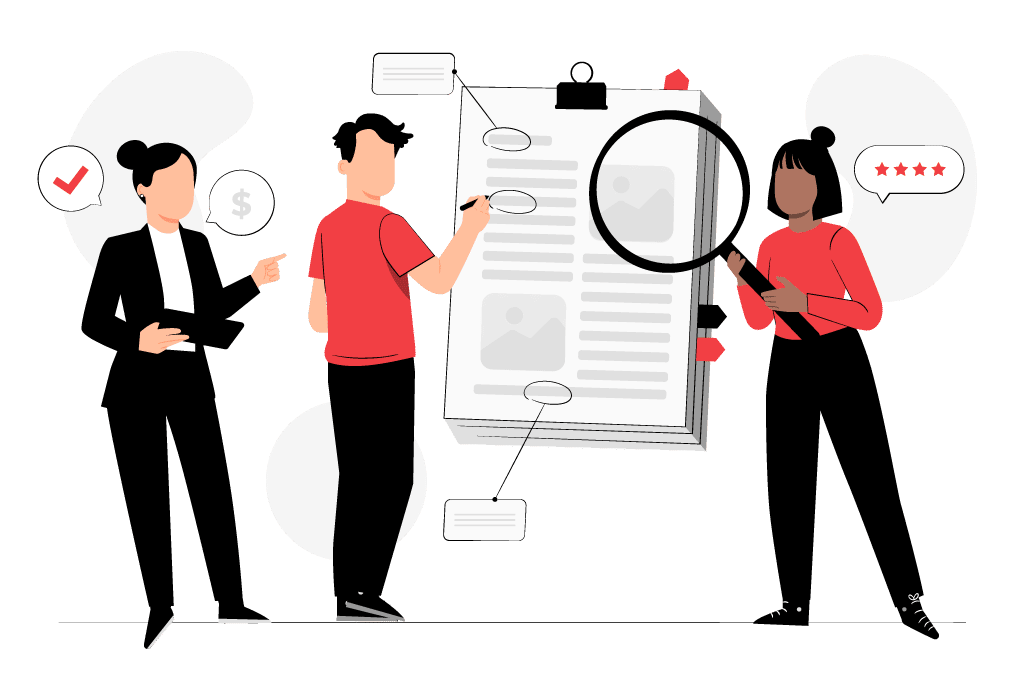In the ever-evolving landscape of the workplace, one fundamental truth remains unchanged: a company’s most valuable asset is its people. As we step into 2023 and gaze into the horizon beyond, the world of work continues to transform in profound ways. For recruiters, founders, and hiring managers, the ability to attract and retain top talent while fostering a thriving, engaged workforce is an ongoing challenge.
According to zenefits, more than 600 US businesses with 50-500 employees, 63.3% of companies say retaining employees is actually harder than hiring them.
In this dynamic era, the concept of employee experience has taken center stage. No longer limited to just salary and benefits, it encompasses a holistic view of an employee’s journey within an organization. To succeed in this competitive environment, businesses must adapt and embrace the latest trends that are shaping the employee experience landscape.
In this blog, we will delve into the five key trends that are poised to define the employee experience for 2023 and beyond. These insights are tailored to the unique needs and expectations of recruiters, founders, and hiring managers, helping you stay ahead in the quest for talent and organizational success. So, let’s embark on this journey to explore the future of work and discover how you can ensure your company thrives in this new era of employee experience.
Emphasis on hybrid work models
The workplace of today is undergoing a profound transformation, and one of the most prominent shifts in employee experience is the widespread adoption of hybrid work models. As we enter 2023 and look toward the future, it’s clear that the lines between in-office and remote work are becoming increasingly blurred. For recruiters, founders, and hiring managers, understanding the nuances of this hybrid work environment is critical to creating an employee experience that truly resonates with the workforce.
Hybrid work models offer employees the flexibility to choose where and how they work, striking a balance that suits their individual needs. This flexibility is not just a fleeting trend but rather a long-term change in how work is approached. Organizations that adapt successfully to this shift will have a competitive edge in attracting and retaining talent.
From a recruitment standpoint, it means expanding the pool of potential candidates. Now, geographical location doesn’t have to be a limiting factor when searching for the best fit for a role. Remote work options can open doors to diverse talent pools, allowing companies to tap into a broader range of skills and experiences.
For founders and hiring managers, the challenge lies in creating an environment where both in-office and remote employees feel equally valued and integrated. This requires rethinking traditional office-centric policies and culture to accommodate remote workers effectively. Ensuring clear communication, equitable opportunities, and a sense of belonging for all employees, regardless of their physical location, becomes paramount.
The hybrid work model also raises questions about performance measurement and accountability. Founders and managers need to rely more on output-based assessments rather than monitoring hours spent at a desk. Setting clear objectives and outcomes for all team members will be essential.
Incorporating the latest collaboration tools and technologies will further facilitate the seamless functioning of hybrid teams. Video conferencing, project management platforms, and instant messaging apps will be integral to maintaining connectivity and productivity, regardless of where team members are situated.
In essence, the emphasis on hybrid work models reflects a new era in the employee experience. Successful adaptation will require recruiters to cast a wider net, founders to rethink organizational culture, and hiring managers to embrace a results-oriented approach. By mastering this trend, companies can create an employee experience that caters to the diverse needs of their workforce, fostering an agile, adaptable, and motivated team for 2023 and beyond.
Personalization and flexibility
As we enter 2023 and peer into the future of work, one prevailing theme in the employee experience landscape is personalization and flexibility. Gone are the days of rigid, one-size-fits-all employment structures. In this new era, recruiters, founders, and hiring managers must be attuned to the individual needs and aspirations of their workforce.
Personalization in employee experience means recognizing that every employee is unique, with distinct goals, preferences, and expectations. It involves tailoring benefits, work arrangements, and career development opportunities to match the diverse requirements of the modern workforce.
Recruiters are no longer merely matching candidates to job descriptions but are actively seeking candidates whose values and expectations align with the company’s culture. This approach is a two-way street, as prospective employees are also evaluating employers based on how well the company aligns with their own values and lifestyle.
For founders and hiring managers, personalization encompasses a range of strategies. This might include offering flexible work hours to accommodate varying lifestyles or providing customizable benefits packages that allow employees to choose options that suit their needs, such as health plans or retirement savings plans.
Moreover, personalization extends to career development and growth opportunities. Employees should have the chance to craft their career paths, and companies should invest in ongoing learning and development programs that align with each individual’s ambitions and abilities. This not only fosters employee satisfaction but also nurtures a more skilled and adaptable workforce.
The flip side of personalization is flexibility, which goes hand-in-hand with accommodating individual needs. Flexible work schedules and locations, as well as options for part-time or contract work, are becoming increasingly popular. Embracing such arrangements can help attract top talent who may seek alternative work setups.
From a hiring manager’s perspective, understanding and adapting to this trend involves being open to varied work arrangements while maintaining the organization’s overall objectives. The challenge lies in managing teams that include full-time, part-time, and remote workers while ensuring that everyone is aligned with the company’s mission.
In conclusion, personalization and flexibility are not just trends; they represent a fundamental shift in the way we approach employee experience. For recruiters, founders, and hiring managers, recognizing the importance of catering to individual needs and providing flexibility is key to attracting and retaining top talent and fostering a workplace that thrives in the ever-evolving world of work.
Wellness and mental health support for better employee experience
In the constantly evolving landscape of the workplace, the importance of employee wellness and mental health support has risen to the forefront, taking on an even greater significance in 2023 and beyond. For recruiters, founders, and hiring managers, recognizing the value of a healthy and well-supported workforce is essential to foster a thriving and engaged team.
The challenges of the past few years have highlighted the need for a holistic approach to employee well-being. The pressures of remote work, economic uncertainty, and the ongoing pandemic have underscored the importance of mental health and stress management. Recruiters understand that today’s candidates are not only evaluating job offers based on salary and benefits but also on the company’s commitment to employee well-being.
Founders and hiring managers play a pivotal role in creating an environment where employees feel supported in their mental health journeys. This includes offering comprehensive mental health programs, destigmatizing seeking help, and encouraging open conversations about mental well-being. It’s not merely about addressing issues when they arise but also proactively promoting a culture that prioritizes mental health from day one.
Wellness programs that encompass physical, emotional, and mental health are becoming standard practice in forward-thinking organizations. Offering resources for stress reduction, mindfulness, and work-life balance can significantly impact employee morale and productivity. Recruiters should seek candidates who value and prioritize wellness while founders and hiring managers must continuously invest in these programs.
In the context of employee experience, mental health support isn’t just a moral obligation; it’s a strategic imperative. Organizations that prioritize mental health see increased employee engagement, reduced absenteeism, and higher levels of job satisfaction. Moreover, they become more attractive to top talent, as potential employees increasingly seek workplaces that value their well-being.
In conclusion, the emphasis on wellness and mental health support is a pivotal trend that recruiters, founders, and hiring managers cannot afford to overlook in 2023 and beyond. Recognizing that a workforce’s well-being directly impacts productivity and retention, organizations that proactively invest in mental health programs and foster a supportive culture will be better positioned for long-term success in the competitive talent market.
Diversity, equity, and inclusion (DEI) initiatives
In the dynamic world of work, the imperative of fostering diversity, equity, and inclusion (DEI) continues to gain momentum as we enter 2023 and beyond. For recruiters, founders, and hiring managers, the commitment to building a more diverse and inclusive workplace is no longer an option but a strategic necessity.
Recruiters have a pivotal role in driving DEI initiatives by sourcing and attracting a diverse talent pool. Beyond the conventional criteria of skills and experience, they must actively seek candidates who bring a variety of perspectives, backgrounds, and life experiences to the table. It’s about creating a rich tapestry of voices that can fuel innovation and creativity.
For founders and hiring managers, creating an inclusive work environment begins with fostering a culture where every individual feels valued and respected, regardless of their background. This goes beyond simple compliance with diversity quotas; it involves building a culture where diversity is celebrated, and equity and inclusion are fundamental principles.
Transparency in recruitment and promotion processes is crucial. Hiring decisions should be based on merit, and opportunities should be available to all. Performance evaluations and compensation packages should be fair and equitable, ensuring that biases and disparities are addressed.
DEI initiatives extend beyond the hiring process. Companies should invest in ongoing education and training programs to raise awareness and promote inclusivity. Founders and hiring managers should actively encourage open dialogue about DEI, providing channels for employees to voice their concerns and ideas.
In the broader context of employee experience, embracing DEI is not only a moral imperative but also a strategic advantage. Diverse teams are more innovative, perform better, and appeal to a broader range of customers. Furthermore, organizations that actively engage in DEI initiatives tend to attract top talent who are increasingly making decisions about where to work based on a company’s commitment to these values.
In conclusion, diversity, equity, and inclusion initiatives are no longer a peripheral aspect of employee experience but a central pillar of success for companies in 2023 and beyond. Recruiters, founders, and hiring managers who prioritize and actively work toward these goals will create workplaces that are not only more appealing to diverse talent but also more innovative and successful in the long run.
Technology and employee feedback
As we step into the future of work, technology is set to play an increasingly integral role in shaping the employee experience, particularly in the domain of employee feedback. For recruiters, founders, and hiring managers, leveraging cutting-edge technology to gather and act on employee feedback will be a game-changer in enhancing workplace culture and performance.
Recruiters can benefit from the use of advanced HR tech solutions to assess candidate fit not only from a skills perspective but also from a cultural and values standpoint. AI-driven tools can analyze candidates’ online presence, social media activity, and publicly available information to gain deeper insights into their personalities and values. These technologies help ensure that new hires align with the company culture from day one.
Founders and hiring managers will increasingly rely on technology to collect real-time feedback from employees. Traditional annual performance reviews are being replaced by continuous feedback loops facilitated by digital platforms. This allows for immediate issue resolution, personalized development plans, and a stronger sense of alignment between individual and company goals.
Furthermore, data analytics and artificial intelligence can uncover trends and insights from employee feedback, helping founders and managers make data-driven decisions. It can highlight areas where improvements are needed, allowing for a more responsive approach to addressing concerns and promoting a positive employee experience.
In the larger context of employee experience, technology streamlines communication and feedback mechanisms. Employee surveys, engagement platforms, and collaboration tools help bridge gaps between in-office and remote teams. They create a space for employees to share their ideas, concerns, and aspirations, and they facilitate a more inclusive, participatory work environment.
Embracing technology and using it effectively to gather and act on employee feedback will be a pivotal aspect of nurturing a productive and engaged workforce in 2023 and beyond. The ability to leverage data-driven insights and maintain constant communication with employees will enhance workplace culture, retention, and performance, benefiting both organizations and their talent pool.
In conclusion, technology’s role in employee feedback is an exciting trend that promises to revolutionize how companies engage with their workforce. By adopting the latest tools and approaches, recruiters, founders, and hiring managers can create a more connected and responsive work environment that is tailored to the needs and expectations of the modern workforce.
Conclusion
As we navigate the ever-evolving landscape of the workplace, the employee experience remains at the forefront of recruitment, organizational development, and management. In 2023 and beyond, several significant trends are set to shape the way we perceive and cultivate the employee experience.
The emphasis on hybrid work models reflects the new normal, with flexibility in work arrangements becoming an essential factor in attracting and retaining top talent. For recruiters, this means expanding the search for candidates beyond geographical boundaries, while founders and hiring managers must reimagine their organizational structures to accommodate remote and in-office employees.
Personalization and flexibility are no longer optional but vital components of the employee experience. Recognizing the unique needs and preferences of each employee and offering customizable benefits and work arrangements will be a defining factor for recruitment and talent retention.
The emphasis on wellness and mental health support underscores the importance of a healthy, balanced workforce. Companies that invest in comprehensive well-being programs and prioritize mental health will find their employees to be more engaged, productive, and satisfied.
Diversity, equity, and inclusion (DEI) initiatives have become central to workplace culture. It’s imperative for recruiters to actively seek diverse candidates, while founders and hiring managers must champion a culture of inclusivity and equal opportunities.
Lastly, technology and employee feedback are set to transform the way we interact with and respond to our workforce. Recruiters can leverage advanced HR tech solutions to ensure cultural fit, while founders and managers can use technology to collect real-time feedback, make data-driven decisions, and bridge gaps between in-office and remote teams.
In this rapidly changing landscape, one thing remains constant: an exceptional employee experience is a cornerstone of a thriving organization. Recruiters, founders, and hiring managers who embrace these trends will not only attract and retain the best talent but also create workplaces that are agile, innovative, and positioned for success in the years to come. The future of work is exciting, and by adapting to these trends, we can make it an empowering and enriching experience for all.
Book a call with Testlify: the best talent assessment tool for your whole team, and get know more about how you can fire up your hiring process without wasting valuable resources. We offer 1400+ on the job skill tests and certification for candidates looking to verify their technical skills.







